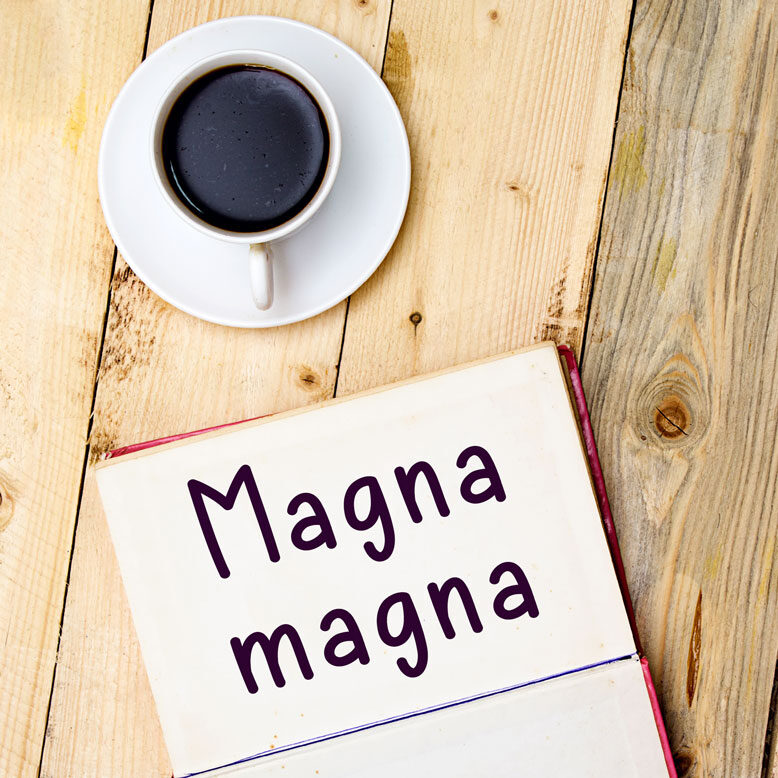One of our readers recently asked us what the expression mangia mangia means in Italian. Before we get down to the nitty-gritty, let’s take a quick look at what mangia means on its own, and how Italians use this word to create various idiomatic expressions.

Learn with our video
What does “mangia” mean in Italian?
Mangia is the third-person singular present of the verb mangiare (to eat). Simply put, this means it is used with the pronouns lui (he), lei (she), Lei (you formal) or any other living thing such as a cane (dog) or gatto (cat) for example.
>> Lui mangia la colazione. = He eats breakfast.
>> Lei mangia la cena. = She eats dinner. / You (formal) eat dinner.
>> Il cane mangia la pappa. = The dog eats the food.
However, mangia is also the second-person singular imperative, which means it is used to give commands to another person. The most literal translation would be Eat! but it is closer in meaning to the friendly expression Eat up!
Dai su, mangia la pasta adesso! Altrimenti si raffredda!
Come on, eat the pasta now. Otherwise it will get cold!

Compound words with ‘mangia-‘
The verb mangiare plays a very important role in the Italian language, to such an extent that it is often used figuratively. For example, you can combine the prefix mangia- with another noun to create compound words that have various idiomatic meanings.
These words are used in colloquial Italian, as well as in journalistic jargon, to define positive or negative habits, or describe a person’s specific characteristic. Some are used in a humorous way, others can be a criticism.
Because there are so many examples, I’ll just mention a couple of them:
- mangiasoldi (lit: money-eater): someone who is well-paid at their job but doesn’t do much to earn it, or something that makes you spend a lot of money, often via illegal methods
- mangiapreti (lit: priest-eater): someone who is strongly against the clergy
- mangiabambini (lit: children-eater): a person who appears grouchy and harsh but in reality is kind and sensitive
- mangiachilometri (lit: kilometre-eater): someone who likes running, cycling or driving long distances on a regular basis, or a bike, car, or truck that one drives long distances on a regular basis
Quel ciclista è un mangiachilometri. È capace di pedalare per lunghissimi tratti senza fermarsi.
That cyclist is unstoppable. He is capable of riding for very long stretches without stopping.
Other words following the same structure are used to identify an object. For example, a mangianastri (lit: tape-eater) or mangiacassette is a cassette player.
What’s more, certain expressions are used to nickname foreigners from specific countries. Germans are mangiapatate (potato-eaters), whereas French are mangiarane (frog-eaters). Similar idioms exist within Italian regions, and there is also one for Italians in general: mangiaspaghetti (spaghetti-eaters).

So what does “mangia mangia” mean?
Mangia mangia, or mangiamangia written as one word, follows the same principle as the compound words explained previously. Although it can literally mean Eat up, eat up!, it is also used to describe a situation where there is continuous corruption and illegal profit, especially within the political sphere. Although English has a range of words and idioms that are potentially good translation candidates, there isn’t one that precisely conveys the meaning of mangia mangia.
Note: There is also the version magna magna which comes from the verb magnare (/maɲˈɲa.re/), the Roman dialect version of mangiare.
È inutile partecipare a quella gara d’appalto. Hanno già deciso chi vincerà. È tutto un magna magna!
It’s useless to participate in that tender procedure. They’ve already decided who will win. It’s a scam!
All’interno del governo c’era un mangia mangia generale.
Within the government, corruption was rampant.
Johnny Stecchino – “Qui è tutto un magna magna!”
A classic Italian comedy in which you can hear the expression magna magna is Johnny Stecchino, which was directed by and stars the hilarious Roberto Benigni. It follows the life of Dante, a school bus driver who bears an uncanny resemblance to an Italian mafioso named Johnny Stecchino who is wanted by Sicilian mobsters.
In the following scene, Dante, who is at the police station, grabs the half-eaten banana in the Colonel’s hand and says:
Questa qui me la prendo io perché qui è tutto un magna magna!
I’ll take this because this place is steeped in corruption!
Obviously the meaning here is twofold: magna magna is a nod to both the banana-eating and what Dante feels is rampant corruption at the police station.
This article is also available in video format on our YouTube channel. The audio version can be found on Podbean, Google Podcast, Apple Podcast and Spotify.
Heather Broster is a graduate with honours in linguistics from the University of Western Ontario. She is an aspiring polyglot, proficient in English and Italian, as well as Japanese, Welsh, and French to varying degrees of fluency. Originally from Toronto, Heather has resided in various countries, notably Italy for a period of six years. Her primary focus lies in the fields of language acquisition, education, and bilingual instruction.


